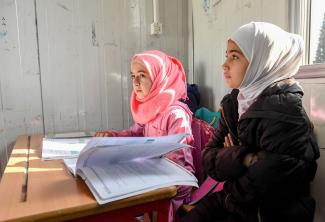Study
Comforted by talking to God

Why did World Vision do the study?
There is a great deal of evidence showing that faith helps adults to cope with difficult life situations. For children, the research is still in its infancy. We wanted to make a contribution to that research and interviewed children and their families who described themselves as religious and were willing to talk about their faith.
What makes religion a relevant issue?
Religion is a relevant issue because it is very important for many people currently coming to Germany as refugees. Religion is often an intrinsic part of their daily life and identity. Support services and structures used to reach out to refugees must not conflict with their religious beliefs and certainly not discriminate on the basis of religion. Our study also shows the societal potential of religion: many of the children we interviewed are guided by religious values of tolerance and peace towards fellow human beings – wherever they come from and whatever their religion.
What are the main findings of the study?
One thing the study showed is that the different religions’ notions of God and even their religious values are very similar. If you listen to children talk about their relationship with God and about religious values that are important to them, you often cannot tell which religion the child belongs to. Another important finding is that unlike many adults, children experience religious diversity on a daily basis at school. It is something they generally have no problem with and do not question.
What did you find out about the ways in which religion can help children to cope better with experiences of war and migration?
For many children, whatever their religion, free prayer, talking to God and even thinking about God is an important way of dealing with stressful situations. Asking for God’s aid or support helps them to express their fears and gives them courage and hope. Many children who crossed the Mediterranean by boat report that they prayed during their ordeal. But their prayers are also often for family members left behind in their country of origin. Even young children, around eight or ten years of age, say they find free prayer a source of comfort, strength and reassurance, which indicates the special importance of prayer for resilience.
Were you surprised by some of the findings?
I was particularly surprised by parents’ openness to interreligious education. Parents positively want interreligious education for their children so that prejudices against other religions can be minimised and children learn to treat others with consideration and respect. I was also surprised how calmly parents deliver religious education. Religion is present and very much integrated in daily life, in the form of prayers for example. Parents regularly invite their children to participate in prayers or rituals but they do not pressure them. They help the children decide for themselves when and how they pray. I was also impressed that even the eight-year-olds we interviewed were able to articulate a free prayer. In Germany, children are not considered to have reached religious maturity until the age of fourteen. Our interviews showed that religion is understood and performed even by younger children.
What methods did you use to interview the children and get into conversation with them?
Creative activities can be used as an aid to discussion of abstract subjects. For example, we asked the children in the interviews to visualise their relationship with God with the help of coloured threads. When choosing our methods, we made sure they were appropriate for an interreligious context. It may be common in Christianity to paint pictures of God but it is not an option for Muslims because of the prohibition of images. It is a fallacy to think that adults have no problems verbalising what constitutes their faith. So creative activities can be used for both children and adults. To avoid triggering traumas, a story was used to prompt the children to talk about their escape. In the story, an old woman called Varenka gets into trouble and prays to God. The children were then asked if they themselves had ever been in a situation where they prayed to God. Most responded by talking about their experiences as refugees.
How can the study help in development work?
The study highlights approaches that can be used to help people – especially children – with traumas. It also flags up the need to train lay workers so that traumatised children can be identified before professional help is available. What is more, from the host of international projects that World Vision supports we have come to appreciate the importance of involving religious actors in educational projects – because many of them teach values. We need to recognise the importance of religion in our society and the potential it holds.
Link
World Vision, 2020: Flight, religion, resilience: faith as a resource for coping with the challenges of migration and integration.
https://www.worldvision.de/sites/worldvision.de/files/pdf/World_Vision_Studie_Resilienz_en.pdf
Caterina Rohde-Abuba is head of research at World Vision Germany and co-author of the study.
caterina.rohde-abuba@wveu.org







